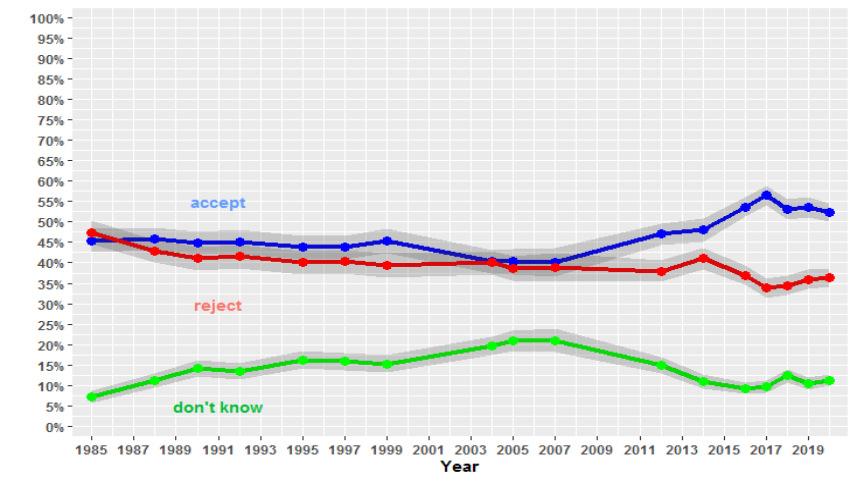Examining data over 35 years, the study consistently identified aspects of education — civic science literacy, taking college courses in science, and having a college degree — as the strongest factors leading to the acceptance of evolution.
“The more education you have, the more likely you are to accept evolution,” observed co-author Glenn Branch, deputy director of NCSE, adding, “The proportion of Americans with a college degree almost doubled between 1988 and 2018.”
The researchers analyzed a collection of biennial surveys from the National Science Board, several national surveys funded by units of the National Science Foundations, and a series focused on adult civic literacy funded by NASA. Beginning in 1985, these national samples of U.S. adults were asked to agree or disagree with this statement: “Human beings, as we know them today, developed from earlier species of animals.”
The series of surveys showed that Americans were evenly divided on the question of evolution from 1985 to 2007. According to a 2005 study of the acceptance of evolution in 34 developed nations, led by Miller, only Turkey, at 27%, scored lower than the United States. But over the last decade, until 2019, the percentage of American adults who agreed with this statement increased from 40% to 54%.
The current study consistently identified religious fundamentalism as the strongest factor leading to the rejection of evolution. While their numbers declined slightly in the last decade, approximately 30 percent of Americans continue to be religious fundamentalists as defined in the study. But even those who scored highest on the scale of religious fundamentalism shifted toward acceptance of evolution, rising from 8% in 1988 to 32% in 2019.
“The acceptance of evolution is likely to continue to be obstructed by religious fundamentalism, exacerbated by the politicization of evolution,” predicted co-author Eugenie C. Scott, founding executive director of NCSE. As of 2019, 34% of conservative Republicans accepted evolution compared to 83% of liberal Democrats.
The study, “Public Acceptance of Evolution in the United States, 1985-2010” (paywalled), was just published in the journal Public Understanding of Science, a fully peer-reviewed international journal covering all aspects of the interrelationships between science (including technology and medicine) and the public.
Besides Miller, Branch, and Scott, the authors are Belén Laspra of the University of Oviedo in Spain, Carmelo Polino of the University of Oviedo and Centro REDES in Argentina, and Mark S. Ackerman and Jordan S. Huffaker of the University of Michigan.



